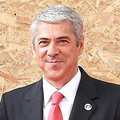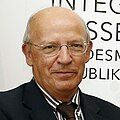This article needs additional citations for verification .(August 2016) |
XVIII Constitutional Government of Portugal | |
|---|---|
| Cabinet of Portugal | |
 Prime Minister José Socrates | |
| Date formed | 26 October 2009 |
| Date dissolved | 21 June 2011 (1 year, 7 months and 26 days) |
| People and organisations | |
| President of the Republic | Aníbal Cavaco Silva |
| Prime Minister | José Sócrates |
| No. of ministers | 16 ministers |
| Member party | Socialist Party (PS) |
| Status in legislature | Minority |
| Opposition parties |
|
| History | |
| Elections | 2009 Portuguese legislative election (27 September 2009) |
| Predecessor | XVII Constitutional Government of Portugal |
| Successor | XIX Constitutional Government of Portugal |
The XVIII Constitutional Government of Portugal (Portuguese: XVIII Governo Constitucional de Portugal) was the 18th government of the Third Portuguese Republic, under the Portuguese Constitution of 1976. It was in office from 26 October 2009 to 21 June 2011, and was formed by the members of the Socialist Party (PS). José Sócrates, leader of the PS, served as Prime Minister. [1]









